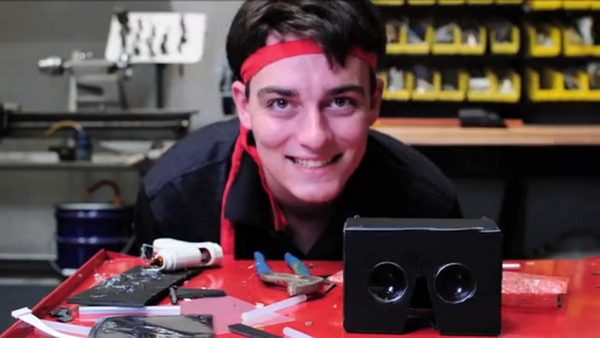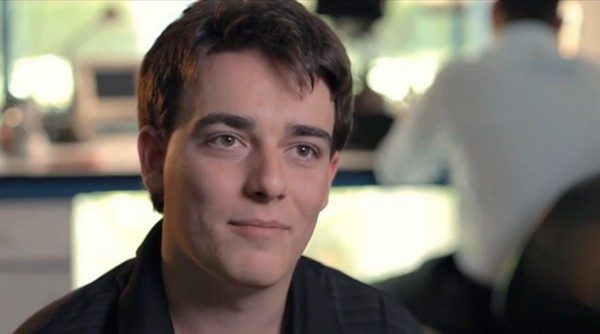Palmer Luckey, who also goes by PalmerTech online, is the creator of the forthcoming Oculus Rift head mounted display and genuine VR nerd (I use that term endearingly). Luckey, who claims to have the largest private HMD collection in the world, remains humble even after his Oculus Rift HMD project spawned a Kickstarter which reeled in $2.4 million. For the most part Luckey has been somewhat reclusive, buried under important work as Oculus LLC approaches the launch of the Oculus Rift developer kit. While I’m very interested in the Oculus Rift, I also wanted to learn more about Luckey himself. Join me for a Q&A with the creator of the Oculus Rift.
Q&A With Palmer Luckey, Creator of the Oculus Rift
Ben: Where are you currently located?
Palmer Luckey: Long Beach, California. Best place in the world, in my opinion!
Ben: Have you had any prior jobs before Oculus LLC?
Palmer Luckey: Lots of freelance computer and phone repair, worked at a fancy yacht club as a sailing coach for rich kids, spent a few years doing boat repair and maintenance, quit, bummed around for a few months to really focus on virtual reality, got a job at an Army Affiliate Research Center, the ICT Mixed Reality lab, and left on good terms to start Oculus LLC.
Ben: Did you attend university?
Palmer Luckey: Took some community college classes between Golden West City College and Long Beach City College, then went on to CSULB. They were a pain in the ass to deal with, but that is too long of a story to go into right now. I ended up getting more than half my units, then dropped out. It remains to be seen when/if I will go back.
Ben: What are some of your hobbies?
Palmer Luckey: Gaming, diode and gas based laser systems, high voltage weaponry, console modification/portabilizing, sailing, and of course, virtual reality!
Ben: Do you have any siblings?
Palmer Luckey: Three younger sisters.
Ben: How have parents/siblings reacted to your interest in VR and how you are now turning it into a career?
Palmer Luckey: My sisters now brag about me to their friends instead of telling them how strange I am. Well, maybe a combination of both. Parents are happy I am doing what I love, maybe not so happy that all those videogames they told me were a waste of time ended up being as important as I always told them they would be!
Ben: What is your favorite game console?
Palmer Luckey: In terms of currently most used, PC. In terms of “favorite”, probably the GP2X. It was crazy in its time, an open source Linux based handheld game console with full Divx support, TV out, and fantastic emulation capabilities. It was emulating GBA games back when the GBA was still a modern console!
Ben: Favorite genre?
Palmer Luckey: It would be a tie between FPS and old school 2D RPGs. People tell me I need to get with the times, though… I am trying to get into Pay to Win Social Streaming Mobile games (PTWSSM) games, those seem to be getting more popular.
Ben: Favorite game?
Palmer Luckey: Chrono Trigger, without a doubt. VR Chrono Trigger would make my life.
Ben: What games have you been playing lately (assuming you’ve had any time!)?
Palmer Luckey: Well, quite a bit of Doom 3 and Hawken. I have also been brushing up on my Team Fortress 2 skills lately, I used to play all the time, I am fitting in few matches here and there when I can.
Ben: If you could choose one already-launched game to play with perfect VR (ultra high resolution HMD, 180 degree FoV, 0 latency, full body tracking, etc.), which would it be?
Palmer Luckey: That is a tough one… if it was just for me, then probably Fallout 3. If it were accessible to everyone, I would say Second Life. Old, sure, but it has a framework that would allow for it to truly become a Second Life for millions of people.
Ben: Can you tell me a bit about your HMD collection? What units are your favorite?
Palmer Luckey: A lot of my HMDs are in a storage unit, not enough room in my apartment for all of them! I started collecting with the naive hope that I would be able to find an HMD that suited my needs, and kept collecting because I realized I needed to know as much about HMDs as I could before making a good go on my own. My favorite HMDs are my Fakespace Push, my Visionics LVES, and my (heavily modified) Sony HMZ-T1.
Ben: At what point did you realize that the HMD of your dreams was not on the market and that you’d have to make it yourself?
Palmer Luckey: When I got ahold of a Virtual Research V8. It had a 60 degree field of view, and while it was great, it was nowhere near what I wanted; 60 degrees is pretty high for an HMD, and I knew from looking at spec sheets that I was not going to find many things that were better.
Ben: Did you have any expectation that the Oculus Rift would take off as it has?
Palmer Luckey: No expectations, maybe, but I certainly hoped so! Our team was debating what our Kickstarter goal should be, internally, and I was the one who pushed it down to $250k. If we would have barely met that goal, I would have considered the Rift a success.
Ben: After head mounted displays, what is the next big challenge that needs to be overcome for even more immersive VR?
Palmer Luckey: Haptics, definitely haptics. Good haptics that are properly integrated with motion controls are a big challenge, but the results will be worthwhile. Sound is another big challenge, but that is not so much a VR specific challenge.
Ben: Do you have any interest in augmented reality?
Palmer Luckey: I love AR! The concept, at least. I am a field of view junkie, and there is no hardware out there that does AR concepts justice.
Ben: I read on MTBS3D that you’ve got a WizDish for testing — any thoughts?
Palmer Luckey: I need to spend more time testing it before I go too far, but my initial impressions are good. It will be a while before people want to play games on their feet instead of on their couch, but maybe we will get there someday.








